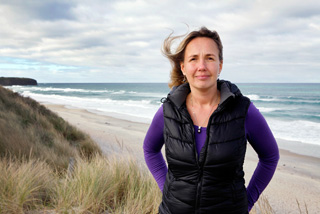 “Returns are not just captured in dollar terms; economics objectively measures worth (or utility) from resource in the broadest sense, incorporating recreational and conservation values as well as financial profit.”
“Returns are not just captured in dollar terms; economics objectively measures worth (or utility) from resource in the broadest sense, incorporating recreational and conservation values as well as financial profit.”
How can economists provide the answers to the issue of allocating scarce fishery resources while managing environmental concerns?
Otago Business School Economics lecturer Viktoria Kahui's cutting edge research is trying to do just that. She is thinking outside the box to find new ways of resource exploitation that is managed both efficiently and effectively, for all.
Sea resources were considered inexhaustible a century ago. While many countries now have some system to manage catches, these do not take into account how ecosystems interact, so by-catches are still destroying the ocean environment. Although the New Zealand fishery quota system works adequately, it is still degrading fragile ecosystems such as sea lion populations and habitats.
This is a worldwide environmental issue, and an approach that cannot continue indefinitely. However, developing ecosystem-based management (EBM) for longer-term resource allocation in a modern society is not easy.
What we are doing
Dr Kahui's research is helping address this by unravelling all the issues and requirements of opposing groups and environments in a logical and objective way, so policy makers can in turn make informed decisions on management systems for modern governance structures.
Her latest study into ecosystem management detailed the methods of a very traditional indigenous style of fishery – common property resource management. This is where a group owns and manages a resource, rather than just individuals managing resource quotas.
Using South Island Ngai Tahu kaitiakitanga (stewardship) as an example, she looked at how the integrated common property system managed resources before colonisation. Kaitiakitanga provided Ngai Tahu with a 'toolbox' to manage their resources for local conditions, with rules like temporary restrictions, permanent reserves, ritual and spiritual sanctions and harvest and method restrictions.
Future options
These finding raise questions, and present opportunities for using common property management guidelines that are a potentially seismic shift in policy. “While the traditional system of holistic management I studied may go against the current paradigm, it offers some interesting insights into an effective integrated management system that bridges the gap between ecology and people.”
For instance, could a stakeholder group independent of the government manage ecosystems through an integrated common property system, just as Ngai Tahu did? Could one of the many tools be the current economic incentives provided via government regulation and resource quotas?
Dr Kahui's believes economics has a crucial role in this to help to understand how society can get the most from a resource, whatever that may be. Returns are not just captured in dollar terms; economics objectively measures worth (or utility) from resource in the broadest sense, incorporating recreational and conservation values as well as financial profit.
Contact Details
Dr Viktoria Kahui
Department of Economics
Otago Business School
Tel. 03 479 5278
Email: viktoria.kahui@otago.ac.nz
Department of Economics Staff Profile








